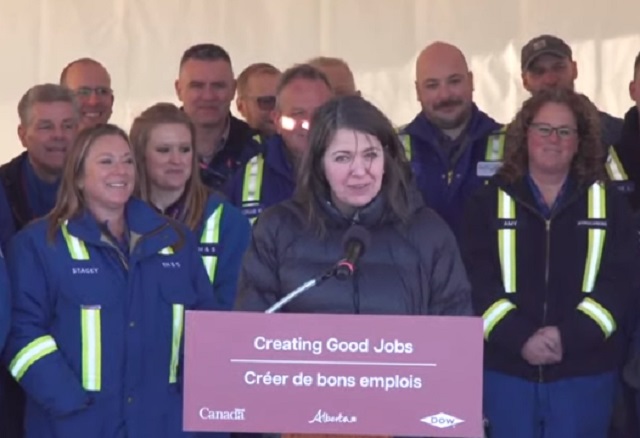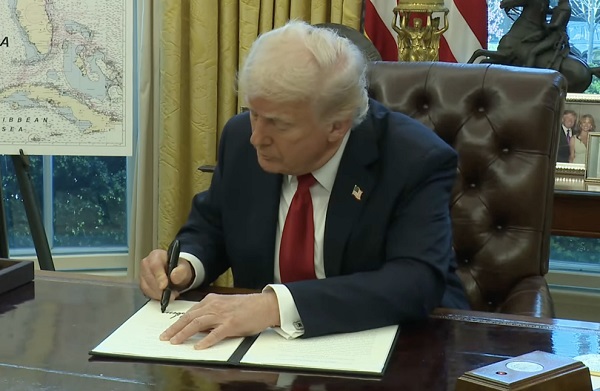Alberta
$6.5 billion boost for Alberta! World’s first ‘net-zero’ ethyelene plant announced for Fort Saskatchewan

Dow Path2Zero investment in Alberta: Joint statement
Premier Danielle Smith, Minister of Energy and Minerals Brian Jean and Minister of Jobs, Economy and Trade Matt Jones issued the following statement on the Dow Path2Zero Fort Saskatchewan project:
“We are thrilled that Dow has chosen Alberta for the world’s first net-zero Scope 1 and 2 greenhouse gas emissions integrated ethylene cracker and derivatives site.
“Fort Saskatchewan Path2Zero, located in Alberta’s Industrial Heartland, will play an important role in expanding Alberta’s natural gas industry, creating thousands of jobs, diversifying our economy and positioning our province as a global hub for petrochemicals.
“At nearly $9 billion, this project is one of the largest private sector investments in Alberta’s history. At peak, this world-class petrochemical facility will create about 6,000 jobs during construction and 400 to 500 full-time jobs when operational. Path2Zero will produce and supply approximately three million metric tonnes of certified low- to zero-carbon emissions polyethylene and ethylene derivatives for customers around the globe while further establishing Alberta as a world leader in emissions-reducing technology like carbon capture, utilization and storage.
“This announcement by Dow is indicative of Alberta’s commitment to attracting investment and creating good jobs while growing and diversifying our economy. Programs like Energy and Minerals’ Alberta Petrochemicals Incentive Program (APIP) and the cross-ministry concierge investment support led by Jobs, Economy and Trade have been integral in Dow’s decision to choose Alberta for this innovative facility. Through APIP, we are issuing a 12 per cent grant, which is approximately $1.8 billion, to help move this investment and technology forward. In addition, we are pleased that Alberta’s skilled workforce, low corporate tax rates, stable industrial carbon pricing system and commitment to support innovation made Alberta the most attractive choice.
“Dow’s final investment decision is proof of the Alberta Advantage, and it will be a major stepping-stone toward meeting our goal of being a global top 10 petrochemical producer. This decision proves what we have been saying for years: Alberta is the best place to invest and do business. We have the workforce, know-how and natural gas feedstock to be a world leader in carbon-neutral petrochemicals.
“This is a huge win for Alberta’s petrochemical sector and clearly demonstrates our business-friendly policies are attracting job-creating investment across the province. We look forward to the beginning of construction in 2024 and are proud to be partnering with Dow to transition away from emissions while decarbonizing petrochemical products and growing our energy industry.”
Alberta
Alberta takes big step towards shorter wait times and higher quality health care

From the Fraser Institute
On Monday, the Smith government announced that beginning next year it will change the way it funds surgeries in Alberta. This is a big step towards unlocking the ability of Alberta’s health-care system to provide more, better and faster services for the same or possibly fewer dollars.
To understand the significance of this change, you must understand the consequences of the current (and outdated) approach.
Currently, the Alberta government pays a lump sum of money to hospitals each year. Consequently, hospitals perceive patients as a drain on their budgets. From the hospital’s perspective, there’s little financial incentive to serve more patients, operate more efficiently and provide superior quality services.
Consider what would happen if your local grocery store received a giant bag of money each year to feed people. The number of items would quickly decline to whatever was most convenient for the store to provide. (Have a favourite cereal? Too bad.) Store hours would become less convenient for customers, alongside a general decline in overall service. This type of grocery store, like an Alberta hospital, is actually financially better off (that is, it saves money) if you go elsewhere.
The Smith government plans to flip this entire system on its head, to the benefit of patients and taxpayers. Instead of handing out bags of money each year to providers, the new system—known as “activity-based funding”—will pay health-care providers for each patient they treat, based on the patient’s particular condition and important factors that may add complexity or cost to their care.
This turns patients from a drain on budgets into a source of additional revenue. The result, as has been demonstrated in other universal health-care systems worldwide, is more services delivered using existing health-care infrastructure, lower wait times, improved quality of care, improved access to medical technologies, and less waste.
In other words, Albertans will receive far better value from their health-care system, which is currently among the most expensive in the world. And relief can’t come soon enough—for example, last year in Alberta the median wait time for orthopedic surgeries including hip and knee replacements was 66.8 weeks.
The naysayers argue this approach will undermine the province’s universal system and hurt patients. But by allowing a spectrum of providers to compete for the delivery of quality care, Alberta will follow the lead of other more successful universal health-care systems in countries such as Australia, Germany, the Netherlands and Switzerland and create greater accountability for hospitals and other health-care providers. Taxpayers will get a much better picture of what they’re paying for and how much they pay.
Again, Alberta is not exploring an untested policy. Almost every other developed country with universal health care uses some form of “activity-based funding” for hospital and surgical care. And remember, we already spend more on health care than our counterparts in nearly all of these countries yet endure longer wait times and poorer access to services generally, in part because of how we pay for surgical care.
While the devil is always in the details, and while it’s still possible for the Alberta government to get this wrong, Monday’s announcement is a big step in the right direction. A funding model that puts patients first will get Albertans more of the high-quality health care they already pay for in a timelier fashion. And provide to other provinces an example of bold health-care reform.
Alberta
Alberta’s embrace of activity-based funding is great news for patients

 From the Montreal Economic Institute
From the Montreal Economic Institute
Alberta’s move to fund acute care services through activity-based funding follows best practices internationally, points out an MEI researcher following an announcement made by Premier Danielle Smith earlier today.
“For too long, the way hospitals were funded in Alberta incentivized treating fewer patients, contributing to our long wait times,” explains Krystle Wittevrongel, director of research at the MEI. “International experience has shown that, with the proper funding models in place, health systems become more efficient to the benefit of patients.”
Currently, Alberta’s hospitals are financed under a system called “global budgeting.” This involves allocating a pre-set amount of funding to pay for a specific number of services based on previous years’ budgets.
Under the government’s newly proposed funding system, hospitals receive a fixed payment for each treatment delivered.
An Economic Note published by the MEI last year showed that Quebec’s gradual adoption of activity-based funding led to higher productivity and lower costs in the province’s health system.
Notably, the province observed that the per-procedure cost of MRIs fell by four per cent as the number of procedures performed increased by 22 per cent.
In the radiology and oncology sector, it observed productivity increases of 26 per cent while procedure costs decreased by seven per cent.
“Being able to perform more surgeries, at lower costs, and within shorter timelines is exactly what Alberta’s patients need, and Premier Smith understands that,” continued Mrs. Wittevrongel. “Today’s announcement is a good first step, and we look forward to seeing a successful roll-out once appropriate funding levels per procedure are set.”
The governments expects to roll-out this new funding model for select procedures starting in 2026.
* * *
The MEI is an independent public policy think tank with offices in Montreal, Ottawa, and Calgary. Through its publications, media appearances, and advisory services to policymakers, the MEI stimulates public policy debate and reforms based on sound economics and entrepreneurship.
-

 Also Interesting2 days ago
Also Interesting2 days agoMortgage Mayhem: How Rising Interest Rates Are Squeezing Alberta Homeowners
-

 Alberta2 days ago
Alberta2 days agoAlberta takes big step towards shorter wait times and higher quality health care
-

 Business2 days ago
Business2 days agoStocks soar after Trump suspends tariffs
-

 COVID-192 days ago
COVID-192 days agoBiden Admin concealed report on earliest COVID cases from 2019
-

 Business2 days ago
Business2 days agoTrump raises China tariffs to 125%, announces 90-day pause for countries who’ve reached out to negotiate
-

 Business2 days ago
Business2 days agoScott Bessent Says Trump’s Goal Was Always To Get Trading Partners To Table After Major Pause Announcement
-

 2025 Federal Election1 day ago
2025 Federal Election1 day agoResearchers Link China’s Intelligence and Elite Influence Arms to B.C. Government, Liberal Party, and Trudeau-Appointed Senator
-

 Energy2 days ago
Energy2 days agoTrump signs four executive orders promoting coal industry





